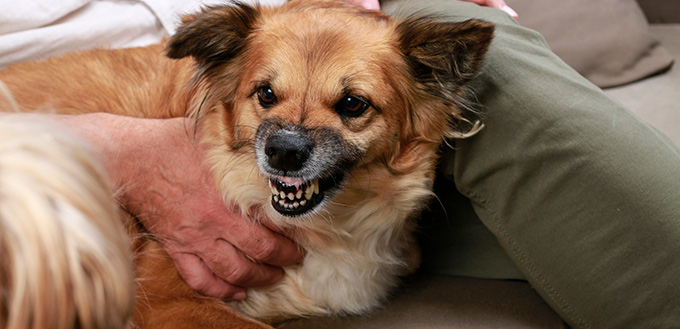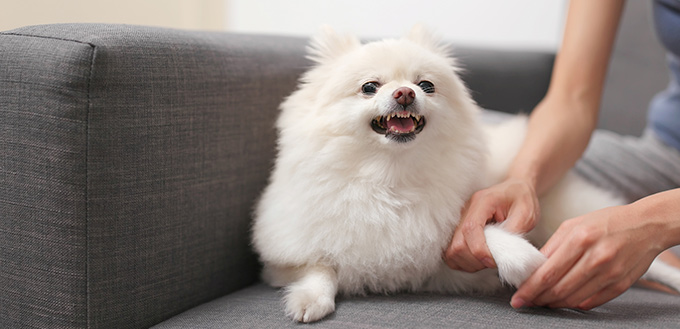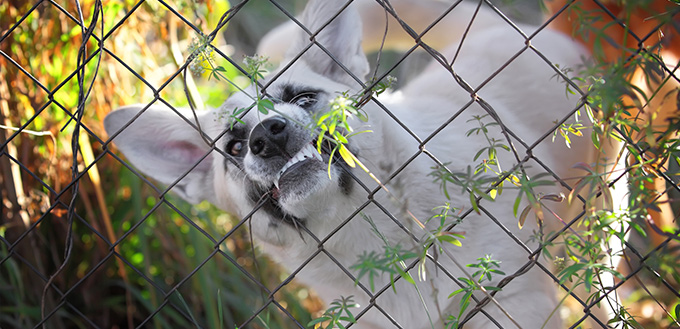There are all sorts of sounds your dog might make. Sniffling, barking, yapping, yelping, whining, crying, and, of course, growling, are all little clues about their feelings. You might think you know what all these sounds mean, but it isn’t always clear. Growling, for example, can sound scary and it is easy to assume that it is simply a negative sign of aggression that should be dealt with. However, it is part of the complex system of communication that your dog has at their disposal.

Understanding Your Dog
Getting to know your dog can be difficult. After all, it’s not like dogs speak English! But that doesn’t mean they can’t communicate. Learning to understand your dog is a major part of being a dog owner. It isn’t just enough to keep them alive, you want to know what makes them happy, what makes them sad, and how to give them the fun and happy life they deserve.
Growling is a crucial part of this. Many dog owners see growling as a sign that their dog is angry and aggressive. They might even worry that their dog is going to attack someone or something. However, it can be more complicated than that. These dog growling sounds could be a number of things, including happy sounds, warning sounds, and angry sounds.
Basically, if your dog is growling, don’t simply punish them and move on. Look at their environment and their body language, figure out what is causing it, and listen to what they are trying to tell you. Unfortunately, as there could be a number of causes, you need to go a step further if you want to understand what they are saying.
Reasons Your Dog Might Be Growling
If you want to understand any sound or behavior, you must first understand the various reasons they might be making that sound. Your dog has various sounds and body language cues that can tell you what they are thinking. You should also look at what else is going on in their life and the environment. There are six key types of dog growls:
1. Territory
If you’ve ever wondered ‘why do dogs growl at each other?’, a common explanation is territory. It may be at your local park, where you’ve been going every day for 5 years, or in your home when a doggie friend comes to visit, but if you meet a dog in a location that your dog considers to be their territory, they might bark, snarl and growl at them. Even old friends might get growled at. It is your dog’s way of warning other dogs to be careful as they will protect their stuff, which includes their people.
2. Possessiveness
Similarly, a dog might growl when their property seems under threat. This might explain your dog growling at their brothers and sisters, or at other family members. They might take issue with someone unusual touching or going near their bowl, their favorite toy or a bone. It might be a different family member feeding them while you are ill, growling as they gnaw on a bone, or any other defensive attitude. If they want to tell you that they don’t want to share, a growl is a good way to do it.
Related Post: Best Dog Toys
3. Pain
Growling can also be a symptom of a medical concern. Think of it as how they might defensively lashing out when they are in pain. A sense that something is wrong, feeling vulnerable and grumpiness due to pain can all combine to make your dog growl. If there are no obvious cuts, bumps, or bruises, your dog might still be suffering from joint pain, digestive issues, and any of the many other causes of invisible pain. Watch out for other signs of pain, such as
- Whining
- Curling up and hiding
- Limping
- Fatigue
- Constant grooming to soothe
- Panting
- Being less mobile
If your dog is exhibiting any of these symptoms, they might be trying to tell you that they are unhappy and in pain.

4. Fear of the Unknown
Fear might also be the cause of your dog’s growling. Remember that dogs’ senses are often much more sensitive than ours. Their growls may be a reaction to something unfamiliar that we can’t smell or sense. Often when my dog keeps growling at nothing, it turns out another dog was around the corner or there was an unfamiliar scent that put him on edge. Unfamiliar situations can also freak them out. Puppies are more susceptible to this kind of growling as they have less experience with seemingly normal things, like snow or seeing you with a scarf and hat, but any dog might struggle when routine is broken or life changes. A growling dog may be trying to tell you he is scared.
5. Anxiety or Fear of the Known
Dogs can also be pretty smart and intuitive. This might lead them to correctly guess what is about to happen, which can in turn cause anxiety. The most obvious example of this is if they spot the patterns that go with taking them to the vet. Going into the area where your store their travel cage, getting the car keys as well as their lead, or maybe even hearing the word ‘vet’, could set them off to growl at you. Other negative experiences, like preparing to leave them when you go on holiday, could also create anxiety that results in growling.
Related Post: Best Dog Backpack Carriers
6. Enjoying Themselves
Last, but not least, you shouldn’t assume that growling is always negative. Sometimes dogs growl when they are having a fun playing. In particular, playing with tug toys can induce growling, and playing with other dogs. Play growling is mostly completely harmless and is just a sign that they are having a good time, which is not something you want to take away from your dog. However, monitor it closely when they are playing with other dogs as very rough play may turn to genuine aggression. In this case you would need to carefully separate the dogs if you can do so without getting hurt.

Stopping Your Dog From Growling
The first, and most important, thing to remember with growling is that you don’t actually want to stop it. This might sound counter-intuitive, but if you train away their urge to growl, you are removing any warning that they are going to bite. Punishing them for growling is like telling a baby off for crying. There is usually some other cause that is more important to deal with.
Whether you are wondering how to stop a dog from growling at strangers, or growling at their brothers and sisters, you need to find the cause and soothe the underlying issue. If car journeys are an issue causing anxiety, work on improving their associations with cars. This might mean spending time with their favorite toys in the car while it is stationary and the doors are open, and taking them on trips to their favorite places, rather than just the vet.
Similarly, for growling caused by pain, take them to the vet, and for growling caused by possessiveness, make sure they have enough resources to share among their brothers and sisters. Don’t have your dogs eat right next to each other, share toys, or anything else they could become possessive about. Socialization is a crucial preventative method, and solution, for growling at other dogs. Ideally, you would socialize your puppy from a very early age. Have them go on play dates with other puppies, experiencing sharing and fun so that other dogs become a source of joy rather than competition.
It is also possible to prevent, or solve, the problem of growling at other family members. If you need to know how to stop a dog from growling at family members, the best solution is to make sure everyone is contributing to their care. This means you all take turns feeding them, taking them for walks, and playing with them. This makes it less likely that your dog will act possessive over their food or feel anxious about slight routine changes. This also goes for introducing a new member of the family, like a boyfriend or a girlfriend.
If you can’t figure out the source of the growling in order to deal with it, you might want to seek the help of a professional behaviorist. They can also help you train growling out of your dog for specific triggers. For example, if your dog growls at passing cars, they can work with your dog to recondition this stimuli from negative to positive. Remember that trying and failing to find the cause yourself, or struggling to train them yourself, might increase their anxiety and further cement the problem. If you are at a loss go to a professional sooner rather than later.
Sources:
- Dr. William Fortney, How to Train a Dog, HowStuffWorks
- Aggression, The ASPCA







